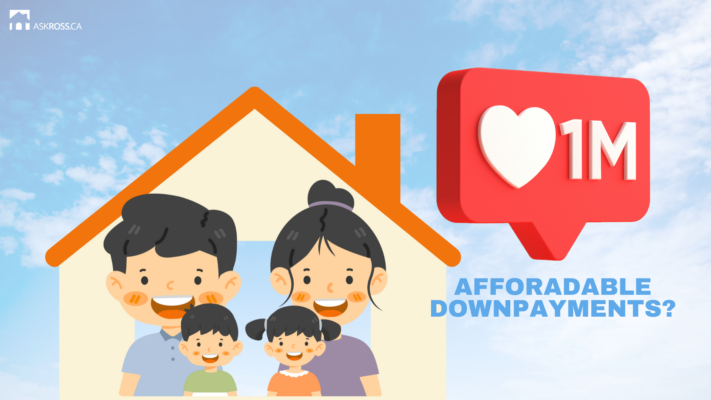
Published: September 18th, 2024 • Last Updated: December 12th, 2024
Author: Ross Taylor on AskRoss.ca
Major changes to Canada’s mortgage rules every buyer should know about
Big changes are coming to Canada’s mortgage market, and no, it’s not just another boring policy update.
These changes might actually make it easier for first-time buyers to get into the housing game. Finally, right?
Starting December 15th, two major updates will roll out, and they could make all the difference, especially if you’ve been watching those ridiculous home prices in Toronto, Mississauga, and Vancouver.
- The insured mortgage cap will rise from $1 million to $1.5 million. About time, eh?
- First-time buyers will be eligible for 30-year mortgages. Yes, you heard that right—more time to pay off your house and maybe even breathe a little while you do it.
It’s about helping first-time buyers keep up in this crazy housing market. Let’s dig into why these changes matter (and why you should care).
Jump to a section in the article ↓↓
- What are the significant changes to Canada’s insured mortgage rules?
- Will minimum down payments change for homes over $1 million?
- Why is expanding to 30-year mortgages a big deal?
- What does this mean for first-time buyers?
- Could these changes cause home prices to increase?
- Is now the time to buy?
- What impact will these changes have on the mortgage market?
- Will mortgage insurance premiums increase for homes over $1 million?
- Advice from Ross Taylor Mortgages

What are the major changes to Canada’s insured mortgage rules?
For the first time in over a decade, we’re finally seeing the price cap for insured mortgages move up—from $1 million to $1.5 million. Now, if you’re in markets like Toronto, where starter homes cost more than a fully loaded SUV, this is a big deal.
Will minimum down payments change for homes over $1 million?
Ah, the million-dollar question (literally). Everyone wants to know if they’ll still have to throw down a huge 20% deposit on homes over $1 million.
Currently, if you’re buying a home over that $1 million mark, you need to cough up 20% of the purchase price for the down payment.
But with the new rules, you could potentially grab a $1.5 million home with as little as 5% down on the first $500,000 and 10% on the remaining amount.
In real terms, that’s a $125,000 down payment instead of the whopping $300,000 it would be under the old rules.
Potential tweaks to down payment rules
They might tweak things a bit (because regulators love to complicate stuff). I wouldn’t be shocked if they bumped the down payment to 12.5% on anything over $1 million, but even then, it’s still way better than forking out 20%. And if that’s what gets you into your first home, then I’m all for it!
December 12, 2024 update – It has been confirmed the min down payment is 5% on first $500,000 and only 10% on the rest between $500,000 and $1.5 million.
And this is on the heels of a fifth cut to the Bank of Canada policy rate since June. This one was 0.5%. These rate cuts, couppled with these new insured purchase rules, are all bullish for real estate prices.
Back to the list at the top ↑↑

Why is expanding to 30-year mortgages a big deal?
Here’s where things get really interesting—because who wouldn’t want lower monthly payments, right?
That’s where the 30-year amortization comes in. For first-time buyers, stretching your mortgage payments out over 30 years instead of 25 gives you a lot more breathing room in your budget.
Sure, you’ll end up paying more in interest over time, but right now, the challenge is getting that monthly payment down to something you can live with.
For example, on a $400,000 home, switching to a 30-year mortgage could knock $200 off your monthly bill. Two hundred bucks! That’s a nice night out or a chunk of your grocery bill taken care of.
Just remember, you’ll pay more interest over the life of the loan, so if you’re okay with that trade-off (and if it means getting into a home sooner rather than waiting for prices to come down—which, spoiler alert, they probably won’t), this could be a smart move.
Back to the list at the top ↑↑

What does this mean for first-time buyers?
If you’re a first-time homebuyer, you’re probably thinking, “Wait, are they finally throwing us a bone here?” Yes! The higher insured mortgage cap and access to 30-year mortgages could be game changers, especially if you’ve been feeling locked out of the market because of huge down payments and soul-crushing monthly payments.
With a higher mortgage cap, you can aim for a better home—one that’s actually worth living in. And with longer amortizations, you’ll get some much-needed breathing room in your monthly budget.
However, lower payments now mean you’ll be in debt longer, and nobody wants to spend their retirement paying off a mortgage, so weigh your options carefully.
Back to the list at the top ↑↑

Could these changes cause home prices to increase?
Let’s face it: anytime they make mortgages more accessible, there’s a chance it’ll push prices up. Remember the last time they adjusted the insured mortgage cap back in 2012?
Home prices have since jumped by 76%. Yeah. It’s like throwing fuel on the housing market fire.
Now, while these changes are aimed at helping first-time buyers, we might see increased competition. That means if you’ve been sitting on the sidelines waiting for prices to drop, you could end up competing with more buyers.
It’s a delicate balance, and the impact will depend on whether the housing supply can keep up with demand (spoiler: probably not).
Back to the list at the top ↑↑

Is now the time to buy?
You’re probably thinking, “Should I jump in now before these changes drive prices even higher?”
Honestly, with these rules coming into effect on December 15th, I wouldn’t be surprised if we see some panic buying in the lead-up. Everyone wants to take advantage of the current rules before the new ones hit.
FOMO is real, folks. If you’re serious about buying, this might be a good time to make your move before the competition heats up and prices creep even higher. But don’t let the rush cloud your judgment. Be strategic about it. Explore your options, crunch the numbers, and make sure it’s the right move for you.
Back to the list at the top ↑↑

What impact will these changes have on the mortgage market?
Here’s where things get interesting for the mortgage market.
By increasing the insured mortgage cap and lowering down payment requirements, more people will qualify for mortgages. That’s great news for buyers who were previously shut out, especially in high-cost areas like Toronto, Mississauga and Vancouver.
And let’s not forget about those 30-year mortgages. They’ll make monthly payments more manageable, which could lower your debt ratios and increase the amount you can borrow.
Lenders and brokers will definitely see more action, and if you’re looking to buy, this opens up a lot of new possibilities.
Back to the list at the top ↑↑

Will mortgage insurance premiums increase for homes over $1 million?
This one’s a bit of a wild card. Mortgage insurance premiums have been pretty reasonable so far, but with the new rules, we could see a slight bump for homes over $1 million.
What to expect with mortgage insurance premiums
Maybe the premiums will increase a little. Maybe they won’t. Either way, it shouldn’t be anything that’ll break the bank. If the goal is to help buyers afford homes, I can’t see them making premiums so expensive that it cancels out the benefits of the new rules.
Back to the list at the top ↑↑

Advice from Ross Taylor Mortgages
Look, these are some of the biggest changes we’ve seen in Canada’s mortgage market in years.
Raising the insured mortgage cap to $1.5 million and giving first-time buyers access to 30-year mortgages could make a real difference, especially in high-priced markets where buying a home feels like winning the lottery.
But don’t forget—these changes come with trade-offs. A lower down payment and longer amortization might get you in the door, but it also means you’ll pay more interest in the long run. It’s important to look at the whole picture and determine what’s best for you.
If you’re considering buying, now’s the time to reach out. Let’s chat about your goals and how these changes can help you achieve them. Whether you’re looking to take advantage of the new rules or just want to know your options, my wonderful team and I are here to help.
Back to the list at the top ↑↑

Ross Taylor Mortgages
If you want great service from someone you can trust – reach out to us today.
Get quick answers to your questions, no matter how difficult – 7 days a week.

 Apply For a Mortgage
Apply For a Mortgage